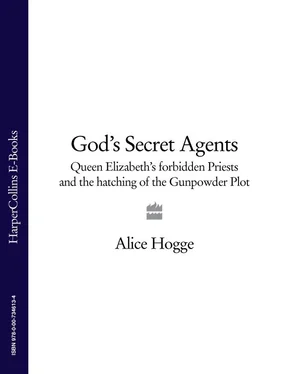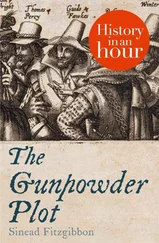On 24 November England at last felt confident enough to celebrate its victory and ‘a solemn procession…was held to give thanks to God for the scattering of the Spanish fleet’. Through winter streets hung with blue cloth, Elizabeth ‘was carried in a gilded chair…drawn by two grey horses royally caparisoned…to the great cathedral of St Paul’s’, from the battlements of which eleven captured Armada banners streamed out above the city. Here, Elizabeth read out a prayer she had composed specially for the occasion. The mood was one of relief, but also, more pertinently, of sober thanksgiving. In the words of the medal struck to celebrate England’s victory: ‘God blew and they were scattered’. The victory was His. 16
And in giving this victory to God, Elizabeth extended a process begun by her father, Henry VIII, many years before: the process of nationalizing England’s state religion. *It was an inadvertent process, born out of fear: Henry’s fear of plunging his country back into yet another round of civil war if he failed to produce a male heir. And it was a process concluded in fear: the fear of standing alone and vulnerable against the richest and most powerful nation in Europe. The God who won the Armada could not be a Protestant God, at least not in the way Protestantism was understood throughout the rest of Europe. That God had demonstrably failed to help the Calvinists in the Low Countries; to protect the Huguenots of France from the St Bartholomew massacre of 1572; to save William of Orange from assassination in 1584. Neither could He be a Catholic. Not when the Armada carried at its head a consecrated standard bearing the rallying cry ‘Arise, oh Lord, and avenge thy cause’. Not when each ship had been provided with its own priest and each member of the expedition had received absolution in advance for the blood he would shed. *Therefore, He could only be an Anglican God, that compromise and most English of Gods, who continued to frustrate both Catholics and Protestants in almost equal measure. †So the subtle propaganda ran. In a Europe ravaged by wars of religion, only the English had chosen correctly. 17
And how lucky it was that God should be an Anglican, an Englishman, for no one believed for a moment that England’s conflict with Catholic Spain was over. Indeed, at the beginning of November the Venetian ambassador to Spain reported home to the Doge that ‘In spite of everything, His Majesty shows himself determined to carry on the war.’ So though the coach that bore Elizabeth to St Paul’s Cathedral ‘was open in front and on both sides’ so that she might better be seen by crowds of cheering Londoners, yet her Government was taking no risks. An order had been given ‘that in every household along the route no one should be allowed to look out from the windows while she was passing, unless the householder was prepared to stake his life and entire fortune on his trustworthiness.’ This was an England gripped in the jaws of fear and suspicion. 18
On Friday, 28 October 1588 a sailing ship beat its way slowly up the Norfolk coast. On board, its passengers scanned the shoreline for a suitable landing place. Having spotted what looked like a safe point between Happisburgh and Bacton, some miles to the south of Cromer, they ordered the crew to drop anchor until nightfall. As darkness fell the ship’s boat was launched and headed into shore. When it returned to the ship, it left standing on the beach two young Englishmen of whom the English Government had every reason to feel fearful and suspicious. The pair were Catholic priests belonging to the Society of Jesus, and their intention was to succeed where the Spanish Armada had failed: to return England to the Catholic Church. If the Armada was the latest in a progression of Franco-Spanish ‘Enterprises’ sanctioned by the Pope and designed to restore English Catholicism through force of arms, then these two young men represented Rome’s second line of spiritual attack: force of argument. * 19
Argument had always been the Christian Church’s best weapon against heresy, chiefly because most heretical behaviour was thought to be a consequence of ignorance, poor judgement, or an imperfect understanding of the teachings of Christ. †Such heretics were not sinful therefore, merely misguided, and required little more than clear reasoning to make them see the error of their ways. Of course there were other heretics who wilfully rejected Christ’s doctrines—out of pride, or a lust for power perhaps. They were sinners and merited the full weight of the Church’s wrath, which, ever since the eleventh century, had usually meant burning at the stake. There was a further subset of heresy still: schism, the rejection of papal supremacy. For the rebellious schismatic (who might uphold all Christ’s other teachings but this one) as for the misguided heretic, argument was deemed the best form of correction. So while Rome supported the invasion of England and the deposition of Elizabeth—her wilful heresy had imperilled the souls of her countrymen and God would forgive the use of force against her—it also dispatched its army of arguers. It was belief in the divine purpose of their argument that filled the two Englishmen now standing in the dark of a Norfolk beach, straining to hear above the noise of the waves on the shingle any sound to suggest their landing had been observed. * 20
Neither man had been long enough in Rome to forget the seeping chill of late October English rain. The bad weather that had so hampered the Armada had not abated and the year was ending with as cold a spell as it had begun. But the rain and the cold were the least of the two men’s worries as they now tried to put as much distance between them and the coast before dawn. In the dark it was impossible to pick a path that did not lead them up to a house instead of out into open fields. Twice, three times, a dog barked as they neared one of the fishermen’s cottages flanking the beach and hastily they retraced their steps. Finally, they headed into a nearby wood to take cover until first light. There, in whispers, they decided it would be safer to separate and each make his own way to London; that way, if one of them should be caught, the other still had a chance of reaching the capital undetected. As soon as it was light enough to see, the older of the two men, twenty-seven-year-old Edward Oldcorne, son of a Yorkshire bricklayer, made his way northwards out of the wood towards the town of Mundesley. On the road he fell in with a party of sailors, demobbed and returning home after the defeat of the Armada, and in their company and with the cover they unwittingly afforded him, he made his way to London.
Meanwhile, his companion was leaving the wood by a different path. John Gerard was twenty-four. He was born on 4 October 1564, the son of the prominent Lancashire landowner Sir Thomas Gerard, a former county sheriff. *At the age of five John Gerard was removed from his parents’ care when it was discovered his father was involved in a scheme to rescue the newly imprisoned Mary, Queen of Scots from Tutbury Castle in Staffordshire and restore her to the Scottish throne. Sir Thomas Gerard was arrested and held in the Tower of London until 1573. On his release he collected his eight-year-old son from the family of strangers on whom he had been forcibly billeted and returned with him to Lancashire, to Bryn Hall, the Gerards’ estate. Whatever the effect on John Gerard of being ripped from his home at so young an age, these events did little to persuade him to conform to the State Church. At the age of just twelve he was sent down from Exeter College, Oxford for refusing to attend a Protestant Easter service. 21
In the summer of 1577 Gerard applied for, and received, a licence to travel abroad to study. For the next three years he attended lectures at Dr William Allen’s English College, first at the University of Douai in the Spanish Netherlands, then, when the college was expelled from there, at the University of Reims. Allen, an exiled Oxford academic, had opened the English College as a training school for those English boys still wishing to enter the Catholic priesthood, now that this was forbidden to them in their own country. The college also offered a thorough education to any English student unwilling to swear allegiance to the new Church of England, an oath required of all those graduating from the universities of Oxford and Cambridge. At Reims Gerard first came into contact with a member of the Society of Jesus, an English Jesuit named Lovel, and from Reims he travelled to Cleremont, the school of the French Jesuits near Paris, determined to join the Society himself. He was not yet sixteen. 22
Читать дальше












